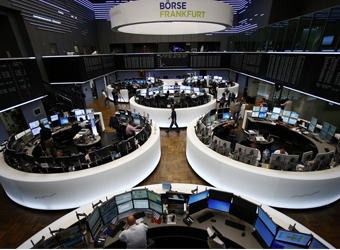Bourses in Europe provisionally ended Thursday lower as investors digested monetary policy decisions from the Bank of England, the Swiss National Bank, and the U.S. Federal Reserve.
The pan-European Stoxx 600 traded 0.36 percent lower with all sectors, bar food and beverages and banks, moving south. The FTSE 100 dropped by 0.74 percent following the Bank of England’s decision to keep its policy unchanged. The central bank is under pressure as inflation rises, wage growth slows down and political uncertainty prevails. The German DAX and the French CAC pared some losses after falling more than a percent but remained in the red.
U.S. markets also opened lower Thursday as technology stocks plunged for the second time this week.
Back in Europe, retail stocks were the worst-performing sector in afternoon deals, down 2.2 percent. H&M dropped more than 5 percent after reporting May sales figures below expectations. The U.K.’s retailer Next also dropped 6.2 percent after a rating downgrade by Credit Suisse. U.K. retail sales data also sent the sector further down after disappointing numbers in May. These fell 1.2 percent last month.
The suggestion of a weakening in the U.K.’s domestic economy has hit shares of kitchen maker Howden Joinery Group, which was one of the worst-performing stocks down by 5.7 percent.
The telecommunications sector was also one of the poorest performers, down 1.43 percent, with Proximus falling more than 4 percent after a rating downgrade by Citigroup.
Looking at individual stocks, Raiffeisen Bank fell as much as 6 percent, also among the bottom of the European benchmark. The stock had already dropped on Wednesday following a rating downgrade by Barlcays saying it is relatively expensive and less geared to rising rates than peers.
Petrofac, on the other hand, led the gains, after a rating upgrade by Jefferies. It was up 8 percent in morning deals before dipping to 3.9 percent in afternoon deals. The oil firm has been up in the last few days following news that it has signed a $35 million deal with Kuwait Oil Company.
Hexagon, which dominated European shares on Wednesday on a potential merger deal, moved slightly lower on Thursday that is to invest 90 million euros in a new factory in China.
Central Banks
The U.S. Federal Reserve decided to raise rates by a quarter point but investors are worried about the weaker-than-expected inflation and slower economic growth. Meanwhile, the Washington Post reported that President Donald Trump is being investigated by a special counsel for possible obstruction of justice.
Back in Europe, the Bank of England left rates at 0.25 percent and bond purchases at £435 billion, as was widely expected.
The Swiss National Bank has kept its target range for three-month Swiss franc LIBOR at -1.25 percent to -0.25 percent and the rate it charges on sight deposits at -0.75 percent, as analysts expected. It said Thursday it remained committed to negative interest rates and currency market.
Euro zone finance ministers are also gathering in Luxembourg Thursday to discuss debt relief for Greece.
Source: CNBC


